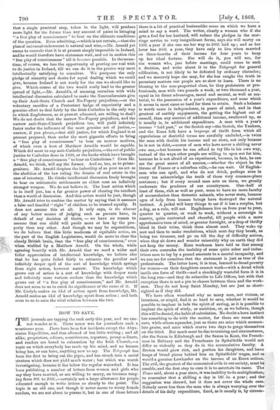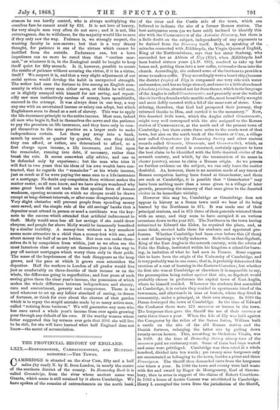HOW TO SAVE.
there is a bit of practical businesslike sense on which we have a mind to say a word. The writer, clearly a woman who if she gets a fool for her husband, will reduce the pledges in the mar- riage service to very insignificant forms, says she will marry on 150/. a year if she can see her way to 2001. laid up ; and as her lover has 2001. a year, they have only to lire when married on three-fourths of their income for four years to heap up her ideal fortune. She will do it, you will see, for the woman who, just before marriage, could come to such a decision, and write about it to the Telegraph for general edification, is not likely to be defeated by ordinary obstacles ; and we sincerely hope she may, for she has caught the truth in pecuniary matters our people are so slow to learn. There is no blessing to the non-propertied class, be they proletaires or pro- fessionals, men with two pounds a week, or two thousand a year, equal in its direct advantages, moral and mental, as well as ma- terial, to the possession of a year's expenditure, and none which it seems in most cases so hard for them to attain. Such a balance is worth more in independence, in peace of mind, and in that greatest of earthly enjoyments, the getting the highest out of oneself, than any amount of additional income, swallowed up, as it usually is, in additional expenditure. A man with a year's income "laid past," as the Scotch say—the Scotch, the Yankees, and the Essex folk have a language of thrift from which all opprobrious or doubtful terms are carefully excluded,—is twice the man with double his income and no store, not only because he is not in debt,—scores of men who have never a shilling never owe one,—but because he can afford to try life in his own way, instead of the ways other people are willing to open out for him, because he is not afraid of an experiment, because, in fact, he can use the great secret of all success,—whether the object be the throne of France or a suburban villa,—he can wait. Of English- men who can spell, and who do not drink, perhaps nine in every ten acknowledge the truth of those very common-place sentences ; but if every second man acts on them, we greatly underrate the prudence of our countrymen. One-half at least of them, rich as well as poor, seem to have no more faculty of accumulation than domestic animals, who never store, because ages of help from human beings have destroyed the natural instinct. A jackal will bury things to eat if it has a surplus, but a dog, as a rule, will not. Englishmen live on from year to year, quarter to quarter, or week to week, without a sovereign in reserve, quite contented and cheerful, till people with a more apprehensive turn of mind, or greater foresight, or a drop of thrifty blood in their veins, think them almost mad. They wake up now and then to make resolutions, which next day they break, as being too tiresome, and go on till the day of difficulty arrives, when they sit down and wonder miserably why on earth they did not keep the money. Keen workmen have told us that among their own comrades the inability of some quite sober and indus-
trious men to lay by a pound amounts to a mental incapacity, and we can see for ourselves that the statement is just as true of the professionals. The latter have, it is true, learned to dread poverty for women—as their daughters cannot work—with a dread which instils one form of thrift—and a shockingly wasteful form it is in the long ran—and they do subscribe to Life Offices, but with that exception there is not a pin to choose between them and the work- men. They do not keep Saint Monday, but are just as short- sighted as if they did.
We have often wondered why so many men, not vicious, or luxurious, or stupid, find it so hard to save, whether it would be possible to implant in lads the spirit of saving, as it is possible to implant the spirit of study, or ambition, or, as we believe, though this will be denied, the habit of calculation. No doubt a born instinct
has something to do with the matter, for there are races which save, while others squander, just as there are mice which accumu- late grains, and mice which starve two days to gorge themselves on the third. But much must be due to training and circumstance, else the Saxon in Edinburgh and the Saxon in Kent, the French- man in Brittany and the Frenchman in Spitalfields would not differ so violently as they do in the accumulative faculty. A Breton would grow rich, and portion his daughters, and leave heaps of broad pieces behind him on Spitalfields' wages, and so would a genuine Lowlander on the income of an Essex artisan. The evil, the greatest of the economical evils in our society, must be curable, and the first step to cure it is to ascertain its cause. The Times said, about a year since, it was inability to do multiplication, to remember that a shilling a day is 18/. 5s. a year ; and the suggestion was shrewd, but it does not cover the whole case. Nobody saves less than the man who is always worrying over the, details of his daily expenditure, fixed, as it usually is, by circum- stances he can hardly control, who is always multiplying the omnibus fare he cannot avoid by 626. It is not love of luxury, for very simple men very often do not save ; and it is not, like extravagance, due to wilfulness, for the majority would like to save if they only saw the way. Patience is, we strongly suspect, the wanting faculty in non-savers; but that is a very dreary thought, for patience is one of the virtues which cannot be instilled from the outside. Endurance can, but a born impatience can no more be cured than that "restless mar- mot," or whatever it is, in the Zoological Could be taught to keep itself quiet for fifty seconds. Is it, however, possible to secure the results of patience without securing the virtue, if it be a virtue, itself ? We suspect it is, and that a very slight adjustment of our social system would develop the habit in unexpected strength. The writer had once the fortune to live among an English com- munity in which every man either saves, or thinks he will save, -or is slightly annoyed with himself for not saving, and repeat- ,etliy saw men instinctively careless of money, born spendthrifts, succeed in the attempt. It was always done in one way, a way any one with an ascertained income or salary can adopt, but which Englishmen seem to dread as a sort of slavery. This was to apply the life-insurance principle to the entire income. Most men, indeed all men who begin it, find in themselves the nerve and the patience to pay the premium on life insurance, and they have only to com- pel themselves to the same practice on a larger scale to make independence certain. Let them pay away into a bank, month by month or quarter by quarter, the sum they think they can afford, or rather, are determined to afford, as a first charge upon income, a life insurance, and live upon the remainder, running into debt, if necessary, rather than break the rule. It seems somewhat silly advice, and one to be defended only by experience ; but the man who tries it will find in two years that his ideas of his own wealth have con- tracted, that he regards- the " remainder " as his whole income, just as mueh as if he were paying the same sum to a life insurance or a mortgage. No doubt any compulsion from without makes the matter easier, as all men know, and we have always wondered why some great bank did not trade on that special form of human weakness, opening accounts on which no cheque could be drawn -except at long-distant intervals, or after some disagreeable process. Very slight obstacles will prevent people from spending money once-saved, and the simple rule of the old savings' banks that a depositor must attend in person or send a certificate was the key- note to the success which attended that artificial inducement to theft. Molly would soon lose all her savings if she could draw cheques, and people far above Molly would be immensely benefited by a similar inability. A money-box without a key somehow -seems more attractive to a child than a money-box with one, and about money the half of us are babies. But men can make them- selves do it by compulsion from within, just as we often see the most luxurious class of society set themselves just in this way to pay off ancient mortgages which worry them only in their pride. The sense of the hopelessness of the task disappears as the heap grows, and the pace at which it grows soon astonishes the depositor. Half the workers in London of all grades would live just as comfortably on three-fourths of their income as on the whole, the difference going in superfluities ; and four years of such saving gives them the clear year's income, the possession of which makes the whole difference between independence and slavery, are and contentment, poverty and competence. There is no need whatever to set up any loftier standard of saving, to dream of fortunes, or think for ever about the charms of that garden which is to repay the stupid mistake made by so many active men, -called "retiring from business." We will guarantee any man who has once saved a whole year's income from ever again growing poor through any default of his own. If the worthy woman whose letter suggested this lay sermon ever gets that 2001. she will live to be rich, for she will have learned what half England does not know—the secret of accumulation.































 Previous page
Previous page